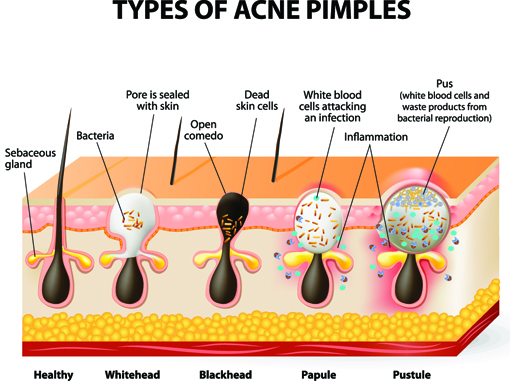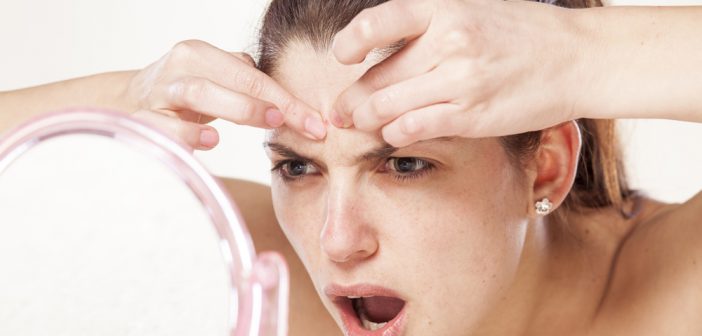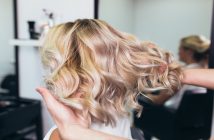Almost everyone deals with acne at some point in his or her life. Some people suffer from chronic acne, while others only get blemishes periodically. No matter what type of acne you have, one thing is always true: you want to get rid of it as quickly and easily as possible.

One of the most prevalent myths about acne is that it is always caused by not washing your face frequently enough. Many types of acne are not triggered by dirt, and people who have acne do not automatically have poor hygiene. One of the biggest steps toward reducing breakouts is developing a routine that you are able to use consistently. Some people enjoy complicated multi-step routines that address every possible skincare concern. Others prefer to keep things as basic as possible. Neither approach is better than the other. The important thing is to be realistic about how much energy you are willing to devote to skincare. Don’t outline a seven-step nighttime routine if you currently struggle to apply moisturizer on a regular basis. Start with a cleanser that removes all of your makeup and excess oil. Your cleanser should make your skin feel clean but not stripped or tight. You may want to pre-wash with a dedicated makeup remover before going in with a cleanser, but it is also acceptable to just do two or three rinses with your regular face wash.

On the other side of the cleansing spectrum, there are people who believe that the only way to eliminate acne is to stop cleansing altogether. If your skin is very dry or sensitive, harsh cleansers can aggravate the skin and cause it to over-produce sebum, leading to breakouts. Dry or fragile skin still benefits from having makeup, sebum and loose skin cells removed by a gentle oil or cream cleanser. Your treatments and moisturizers will not be effective if they do not come into contact with fresh, clean skin.
A major trend in skincare is infusing the skin with as much moisture and hydration as possible. Adding moisture to your skincare routine might seem scary at first, especially if your skin is on the oily side. However, moisturizing agents like argan oil and hyaluronic acid have a very low chance of causing you to break out. If you’ve been using drying products in an attempt to zap your blemishes, consider treating your skin with a noncomedogenic oil instead. You’d by surprised by how smooth and clear your skin can look when you stop being aggressive with your treatments. There’s a good chance that you haven’t seen your skin’s baseline natural state since you were a teenager, so it’s always a good idea to temporarily pare your routine down to a cleanser and a lightweight moisturizer. That way, you can reassess your skin and pinpoint current problems.
Toners are more divisive than perhaps any other skincare product. Some swear by toners. Others feel that toners are little more than expensive facial perfumes. You might think of toners as being aggressive astringents meant to dry out acne. You might even recall the toners of the ’80s, which balanced the skin’s pH after the use of foaming cleansers. These days, “toner” is a general term for a leave-on water-based skincare treatment. Toners give you an easy way to add new ingredients to your routine without having to find a whole new moisturizer or cleanser. To fight acne, look for a toner that contains salicylic acid or glycolic acid. Salicylic acid goes deep into the pores to neutralize bacteria, while glycolic acid disssolves loose skin cells on the surface to prevent them from causing congestion and texture.

If you have achieved a good balance with your skincare routine and still experience breakouts, look into retinoids. Retinoids are intimidating at first. They were once available only with a prescription and are known for causing uncomfortable peeling and rawness if used too frequently. Topical creams like Retin-A work by encouraging the skin to regenerate more quickly, pushing out the blemished skin and forming new layers with no acne or scarring. The old approach to retinoid treatments was that you should use them to clear up your existing acne and then maintain your clear complexion with milder products. Now that so many brands are making mild creams and serums that contain retinol, retinaldehyde and retinyl palmitate, there is no reason to ever stop using retinoids if they’re working for you.
Sunscreen is another point of contention in the world of skincare fanatics. Everyone knows that wearing sunscreen is the best way to prevent the skin from showing signs of aging. People with acne-prone skin also know that wearing sunscreen every day is a surefire way to clog their pores. Sunscreen creams are somewhat unavoidably problematic in this way; because of how they’re formulated, it’s hard to find one that doesn’t lead to other problems. It’s as if you have to choose between having sun damage or using a cream that will make your skin look bad in other ways. You’d be forgiven for feeling that you just can’t wear sunscreen unless you already have perfect skin, but this isn’t the case. Acne sufferers tend to have better luck with sunscreens that use physical mineral ingredients like zinc oxide or titanium oxide. An added perk of these formulations is that they absorb oil and provide a mattified appearance. If these products don’t work for you either, a powder with SPF might be your best option. Powders do not provide complete protection, but they are good options if you can’t wear any other type of sunscreen. You can reapply powder SPF throughout the day and even wear it over makeup, making it more versatile than creams.
Skincare is the more scientific and medicine-based branch of beauty, so it makes sense to periodically challenge long-held beliefs about which products and ingredients are most effective at clearing acne. Moisture and SPF aren’t your enemies anymore. Retinol can be part of a long-term routine, not just a short prescription treatment cycle. When you do your research and build a consistent routine, you’ll start to see results.








